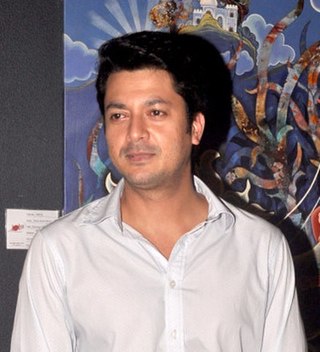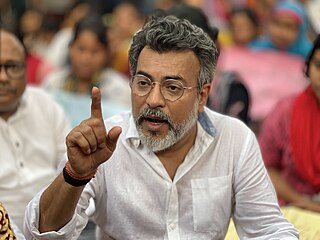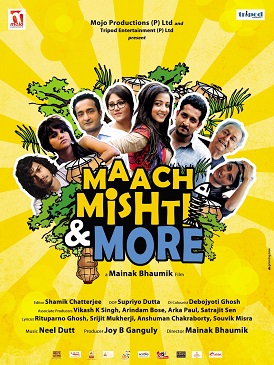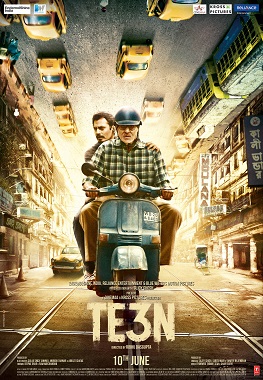
Rituparno Ghosh was an Indian film director, actor, writer and lyricist. After pursuing a degree in economics, he started his career as a creative artist at an advertising agency. He received recognition for his second feature film Unishe April which won the National Film Award for Best Feature Film. Having won 19 National Awards, along with his contemporaries Aparna Sen and Goutam Ghose, Rituparno heralded contemporary Bengali cinema to greater heights. Ghosh died on 30 May 2013 in Kolkata after a heart attack. Ghosh was also one of the openly homosexual personalities in Indian cinema.

Raima Sen is an Indian actress who is known for her work in Hindi and Bengali films.

Antarmahal is a 2005 Indian Bengali film, directed by Rituparno Ghosh, based on a short story by the name Pratima by the renowned Bengali author Tarasankar Bandyopadhyay. It stars Roopa Ganguly, Soha Ali Khan and Jackie Shroff in lead, and Abhishek Bachchan, Sumanta Mukherjee and Biswajit Chakraborty in supporting roles. Raima Sen stars in a cameo role in the film.

Prosenjit Chatterjee is an Indian actor and producer. He is widely regarded as one of the leading actors of modern Bengali cinema. He predominantly works in Bengali cinema. He is the son of veteran Bollywood actor Biswajit Chatterjee.

Chokher Bali is a 2003 Indian Bengali language drama film based on the 1903 novel Chokher Bali by Rabindranath Tagore. It was directed by Rituparno Ghosh in 2003 and stars Aishwarya Rai as Binodini and Raima Sen as Ashalata. Ashalata and Binodini refer to each other as Chokher Bali. The other major characters are played by Prosenjit Chatterjee as Mahendra, Lily Chakravarty as Rajlakshmi, the mother of Mahendra, Tota Roy Chowdhury as Behari, Mahendra's best friend, and Swastika Mukherjee in a cameo role. The film was later dubbed into Hindi and was released internationally in that language.

Khela (2008) is a Bengali film by Rituparno Ghosh. The film is about an idealistic director's quest to make a film with a boy who he thinks is just perfect for the role. Khela also marks actress Manisha Koirala's foray into Bengali cinema.

Jisshu Sengupta is an Indian actor, producer, television presenter, who predominantly works in Bengali, Hindi and Telugu films alongside a few Kannada films.

Rudranil Ghosh is an Indian actor who works primarily in Bengali films.
Anandalok Puraskar or Anandalok Awards ceremony is an award ceremony for Bengali film in India. The Anandalok, only film magazine in Bengali language, published from Ananda Publishers and Ananda Bazar Patrika presents this award (Puraskar). The magazine was started on 25 January 1975 and the awards ceremony was started in 1998.

Tota Roy Chowdhury is an Indian actor who predominantly works in Bengali and Hindi cinema. He is also known for his versatile acting performances, fitness, martial arts and dance moves. His notable roles include Feluda in the web TV series Feluda Pherot based on Satyajit Ray's Feluda series, Chandon Chatterjee in Karan Johar's film Rocky Aur Rani Kii Prem Kahaani and Rohit Sen in Star Jalsha's daily soap Sreemoyee.

Avik Mukhopadhyay is an Indian cinematographer who works in Bengali and Hindi films. He collaborated with eminent directors like Mrinal Sen, Aparna Sen, Rituparno Ghosh, Srijit Mukherji, Kamaleshwar Mukherjee, Anik Dutta, Aniruddha Roy Chowdhury, Shoojit Sircar and Sujoy Ghosh. Some of his most notable works include Chokher Bali, Patalghar, Bhalo Theko, Raincoat, Dosar, The Last Lear, Antaheen, Chitrangada: The Crowning Wish, October and Sardar Udham. He is the recipient of the National Film Award for Best Cinematography four times and the Filmfare Award for Best Cinematographer twice. He studied the cinematography at the Film and television Institute of India.

Arekti Premer Golpo is a 2010 Indian drama film directed by Bengali filmmaker Kaushik Ganguly, written by Kaushik Ganguly. It stars Rituparno Ghosh and Indraneil Sengupta, with Ghosh playing a transgender filmmaker. It is the first film on queerness to be shot after the Delhi High Court struck down portions of Section 377 of the Indian Penal Code in July 2009 as unconstitutional with respect to gay sex. The film premiered at the 60th Berlin Film Festival in 2010.

Noukadubi is a Bengali film directed by Rituparno Ghosh, released in January 2011. The movie is a period film set in the 1920s, based on a 1906 novel with the same name by Rabindranath Tagore, although the credits claim that the film is 'inspired' by the Tagore novel because Rituparno Ghosh has taken the skeleton of the original story and woven it with his own inputs – cerebral and emotional.

Memories in March is a 2010 Indian drama film directed by Sanjoy Nag. The film stars Deepti Naval, Rituparno Ghosh, and Raima Sen. The film is an effective exploration of a situation wherein a bereaved mother comes to terms with her late son's sexual identity. The film was released on 1 Apr 2011.

Aborto is a Bengali film released on 1 March 2013 and directed by Arindam Sil in his directorial debut. According to Sil, this film would be the greatest tribute to Satyajit Ray that has ever been made. The film stars Tota Roy Chowdhury, Bangladeshi actress Jaya Ahsan and Abir Chatterjee in lead roles. The screenplay was written by filmmaker Atanu Ghosh, but was not acknowledged on the posters by the director.

Maach Mishti & More is a 2013 Indian Bengali language drama film directed by Mainak Bhaumik. This is a comedy film about today's Bengali generation. Rituparno Ghosh wrote lyrics of the songs of this film.

Teen is a 2016 Indian Hindi-language mystery thriller film written and directed by Ribhu Dasgupta. This remake of the 2013 South Korean film Montage stars Amitabh Bachchan, Nawazuddin Siddiqui, Sabyasachi Chakraborty, Padmavati Rao, and Vidya Balan in the lead roles. It was released on 10 June 2016. The film was a commercial failure at the box office.
In the Indian state of Jharkhand, films are produced in various regional and tribal languages including Kudmali, Hindi, Nagpuri, Khortha and Santali. Film industry in state of Jharkhand is also known as Jhollywood.
Mukhosh is a 2021 Indian Bengali-language psychological thriller film directed by Birsa Dasgupta starring Anirban Bhattacharya. The film, an official remake of the Malayalam movie Anjaam Pathiraa, released theatrically on 19 August 2021. The movie was released by the name Mukhosh instead of Psycho.
Srijit Mukherji's Cop Universe is an Indian media franchise and shared universe created by Srijit Mukherji, consisting of media focusing on police officers who predominantly solve cases of serial killers. The universe was established by crossing over common plot elements, settings, cast, and characters.
















